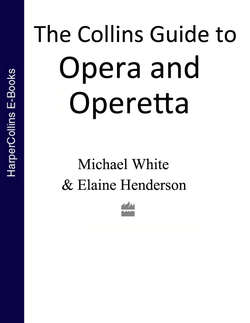Читать книгу The Collins Guide To Opera And Operetta - Michael White - Страница 40
ОглавлениеBilly Budd
FORM: Opera in two acts; in English
COMPOSER: Benjamin Britten (1913–76)
LIBRETTO: E.M. Forster and Eric Crozier; after Herman Melville’s story
FIRST PERFORMANCE: London, 1 December 1951
Principal Characters
Billy Budd, an able seaman Baritone
Captain Vere Tenor
Claggart, Master-at-Arms Bass
Synopsis of the Plot
Setting: At sea on The Indomitable; 1797, during the French wars
ACT I Captain Vere, now an old man, reflects on the inseparability of good and evil, recalling in particular the case of Billy Budd.
Billy is one of three men impressed from a passing merchant ship, significantly named The Rights of Man, to serve on The Indomitable. Both officers and men take to the handsome, cheerful and lively Billy, except for Claggart who takes an instant, and envious, dislike to him and determines to destroy him. Claggart’s sadistic ways terrify the weaker members of the crew, who will do anything to avoid further floggings, including carrying out Claggart’s instructions to persecute Billy. Billy is warned to be wary of the Master-at-Arms, but he brushes the warning aside, even when he is told that Claggart is fomenting a rumour that Billy wants to start a mutiny.
ACT II As mists swirl around the ship, Claggart warns the captain that there is talk of mutiny, but before he can implicate Billy the mists lift to reveal a French ship. Instantly the crew rushes to battle stations, but the mists close round again before any significant damage can be inflicted. Claggart again approaches the captain, claiming Billy as the instigator of a mutiny, and although Vere is incredulous he agrees to interview Billy in Claggart’s presence. Billy, stunned at the charges, is afflicted by his childhood stammer and, unable to speak, strikes Claggart in anger and frustration and kills him with a single blow. Taken before a drumhead court, Billy is sentenced to hang for murder and the captain refuses to intervene on his behalf.
Back in the present, Captain Vere asserts that he could indeed have saved Billy, although he no longer questions why he did not do so. He claims to have found peace and contentment, but his vivid recollection of these powerful events long ago casts doubt on this assertion.
Music and Background
Many Britten enthusiasts find this his most rewarding opera score, and it is certainly one of his biggest, calling for large forces which are used in grand, near-Verdian terms. The cast is all-male but with voice-types so precisely specified for contrast that the music never feels locked in a limited world of sound. And just as the story describes a symbolic conflict between good (Billy) and evil (Claggart), so the music carries an associated symbolism of conflicting keys – heard at the outset when the curtain rises to an accompaniment of two string groups, one playing in B flat Major, the other in B Minor.
Highlights
Claggart’s credo ‘Would that I never encountered you’ is the dark focus of Act I, with the below-decks shanty ‘Blow her away’ its moment of most haunting lyricism. In Act II the Chase Scene is an exhilarating operatic spectacle; Billy’s pre-execution ballad, ‘Look! Through the port comes the moonshine’, a conventional but moving monologue; and the cathartic sequence of thirty-four chords that follows the killing of Claggart manages to say more than words ever could.
Did You Know?
Modern readings of the piece (and of the Herman Melville novel on which it is based) surmise that, rather than hating Billy, Claggart is in love with him.
Recommended Recording
Peter Glossop, Peter Pears, Michael Langdon, London Symphony Orchestra/Benjamin Britten. Decca 417 428-2. A classic, handsomely done (as Claggart actually sings, rather than speaks) and without rival.
